- Home
- Jacob Peppers
A Sellsword's Hope Page 2
A Sellsword's Hope Read online
Page 2
Aaron barely managed to hide his wince. Another story, then, to add to the growing legend of Aaron Envelar, the savior of Perennia, the man who had even bent the demonic Akalians to his will, who had stood—practically alone, if the stories were to be believed—against King Belgarin’s army, holding the gate against impossible odds. All bullshit, of course, but legends, he’d come to learn, didn’t waste much time on the truth.
He hadn’t stood at the gate alone, but with more than a hundred of Perennia’s best-trained troops, and still they would have died if not for Ellemont’s courageous—and ultimately suicidal—charge into the thick of Belgarin’s army. As for the Akalians, they had saved him and the others as surely as Ellemont had. And the knife…well, the truth was that he’d been aiming for the man’s heart, and it was only luck that the blade had struck him at all. Still, he didn’t think it would do any good to tell the soldiers that. They would just think he was being modest, self-deprecating, and that would only make the stories worse, so instead Aaron only nodded. “Well, go on and get them to the dungeons. There’s plenty more work to be done before we’re through.”
The two men nodded and escorted the prisoners out of the house, but Aaron didn’t miss the adoration—bordering on worship—in their gazes as they left. Alone in the house, he took a slow breath, leaning back against the wall, this time not out of physical exhaustion, but surprise and relief that he was still alive. It hadn’t been the wisest course, maybe, rushing the two men, but it had worked out, so that was something.
Not the wisest course? Co scolded. It was beyond stupid, that’s what it was. You can leave those soldiers to believe what they will, but you and I both know it’s by luck, nothing more, that you’re still standing here instead of lying on the floor, hurt or dead. What possessed you to try deflecting an arrow with a knife anyway?
“It worked, Firefly,” he said aloud, since he was now alone in the house. “Isn’t that enough? I thought he would aim for my throat, and he did. So relax, would you? Everybody walked away—it’s a win.”
“And if he hadn’t?” she demanded, materializing in front of him, a swirling ball of magenta light. “If he’d aimed for your stomach? Or your heart?”
Aaron grunted. “Then you and I wouldn’t be having this conversation, that’s all, and I think it would be safe to say you’d have won the argument.”
Co made a sniffing sound. “Arguing with you is like arguing with an ox—there’s no winning it. Even if there should be, the ox is too stupid to know when it’s wrong.”
Aaron gave a small smile at that. “But if all the oxen in the world suddenly grew smart, started reading books and spending their time in libraries, then who would pull all the carts?”
“I…that’s the dumbest thing I’ve ever heard.”
“Well, what do you expect from an ox?” he said, giving a tired laugh that faded as he turned to the door of the house. “I’ll rest, alright?” he promised. “Just as soon as this is done.”
“Sure,” the Virtue said, “what better time to rest than when we’re marching to war?” But she said it without much feeling, and Aaron headed for the door, hoping that the others were faring better than him.
CHAPTER
TWO
“I can’t say as I know why you’re both actin’ so pissed off. It worked, didn’t it?” Wendell said, doing his best to avoid the sullen stares of Darrell and Leomin as they walked down the street. In the early morning hours, the city was crowded, but people made way for them, jumping out of their path as if they were important dignitaries or, maybe, barbarians seeking blood and death. He couldn’t be sure, but he thought it had something to do with his companions. Or, more specifically, their smell. He himself could barely stand walking beside them, but he thought it probably best not to say so under the circumstances. After all, they both seemed to hold him personally responsible which, so far as he was concerned, was completely unfair.
Darrell frowned, obviously struggling to keep his patience as he wiped at a suspicious brown stain on his clothes, doing nothing but smearing it in more as far as Wendell could see. But Wendell noticed the idle way the swordmaster’s fingers had been playing at the hilt of his sword and thought it best not to say so. “It isn’t that we disagree with your method, Sergeant Wendell, and no one can doubt it’s…efficacy. The cart did knock the door in, just as you thought. Only…” He sighed, apparently at a loss for words.
“Only,” Leomin said, scowling as he plucked at something—hay, it looked to Wendell—in his hair. Not for the first time, the sergeant thought a man who took all the time and aggravation to grow his hair out so long and braid it into long strands, even put bells in it, for the gods’ sake, then the least he could do was keep it clean. “Only that maybe it would have been smart to let us know before hand, so that we could get out of the way.”
“Seems to me,” Wendell said sullenly, “that a man shouldn’t need another to tell him to get out of the way, a cart full of hay and shit comes rollin’ at him.”
Darrell cleared his throat, and Wendell kept a close eye on his hand, in case he went for his sword. “Yes, quite, and I’m sure that we would have got out of the way, if given the chance. Foolish of us, I suppose, for thinking to try knocking first.”
Wendell grunted. “Well, you said it, not me.”
“Still,” Leomin said through gritted teeth as the people they passed watched their procession with disgust, several of them coughing as they did and holding their hands to their noses. “Can you explain to me again why it was so important to light the cart—and its…contents—on fire?”
“Oh,” the sergeant said, nodding. “The hay and the shit, you mean? Well, I saw that fella holdin’ the lantern, and I thought, sure, Wendell, the cart ought to break through the door sure enough, but then what if it gets stuck, you know? Or, what if they just keep settin’ in there, waitin’ on us? Seemed to me, the only thing that’d catch me by more surprise than a cart full of fertilizer breakin’ down my door would be if that cart was on fire, and what’s the problem anyway?” He grinned, remembering the look on the faces of the three men who’d come running out of the house like they were being chased by the Death God himself. “It got ‘em out in the street, didn’t it?”
The two men didn’t say anything for some time after that, and how could they? He was right, that was all. He’d had an idea, and it had worked. It wasn’t his fault if they didn’t have sense enough to get out of the way with a cart full of flaming shit rolling at them. They traveled on in silence for a while, and he was starting to hope the whole thing was done, had almost convinced himself that their faces only looked so angry on account of the smoke and…other things…smeared across them. He was even considering striking up a conversation with the three manacled prisoners they were escorting when the swordmaster spoke again. “And the farmer?”
Wendell rolled his eyes. “Ridiculous, the man actin’ so put out like that. Here we are, savin’ the city and all, and he acts as if the world is endin’ on account of one burned-up shit-cart. I ain’t ever heard nothin’ so ridiculous. Still, once he got calmed down, he was alright, I reckon. Charged a fair enough price for the cart and its contents—leastways, I suppose it was fair, but I tell you if I’d known shit went for so much, I might never have went into soldiering, took up shit-farming instead.” He shook his head. “Would have damn near cleaned me out, payin’ all that.”
“Not that you did pay it,” Leomin said, and the sergeant figured the man must be coming down with a cold as his words sounded almost like a snarl. “And wait a minute—what do you mean ‘would’ have cleaned you out?” His eyes narrowed, and there was no mistaking the violence in his gaze now—one that, to Wendell’s discomfort, the swordmaster seemed to share. “You said you didn’t have any coin.”
“Right,” Wendell said, deciding now was as good a time as any to look at the prisoners, make sure they weren’t up to anything. “And that’s true—I’m as poor as any man walkin’ upright can be.” Or, at least, h
e would be, just as soon as he visited Salia later in the evening once their work was done. He thought about telling the men what little money he had was set aside to pay on a contract—and he and Salia had talked about him visiting again the last time he saw her, so that wasn’t a lie—but decided that maybe, with the mood they were in, keeping it simple was the best thing. So instead of talking, he walked on in silence, imagining what the night ahead would be like, and doing his best not to be distracted by the aroma of his two companions.
CHAPTER
THREE
Sighing heavily, May let the parchment—a current report on the city’s western food stores—fall to her desk to land on top of the ever-increasing pile of such reports that littered the wooden surface. She was glad Grinner was gone, but in the short amount of time he’d been in power, the man had managed to sell or steal nearly everything of value. Armor and weapons had vanished, sold to the gods alone knew who. Food was also missing from the stores they’d so carefully accumulated in preparation for the war, not to mention many of the cavalry’s horses. If May didn’t figure out where they’d gone soon, the mounted warriors would be riding into battle on mules, or on each other’s shoulders. Not exactly an image that inspired confidence.
As far as she was concerned, Silent’s answer to Grinner’s crimes had been far too easy an escape for the crime boss; true justice would have been forcing him to sit down at the seat May now occupied and figure out some way to solve the host of problems he’d created. Still, she consoled herself, not everything could be missing. The man had only had a few days for the gods’ sake. Perhaps, if she were to send out some troops to the outlying towns around the city she might be able to find some of the goods, and—
Her thoughts were interrupted by a particularly loud snore, one that rose above the steady drone of its fellows that had accompanied her work for the last hour.
She scowled at the big man with his head on the table, and was disgusted and more than a little annoyed to see a line of drool leaking onto the most recent report of troop numbers. After Aaron and the others had taken back the city, Adina had come to May, thanking her for everything she’d done and apologizing for the fact that her sister had very nearly had the club owner killed. When asking May to once more take over the planning of the army’s logistics and supplies, she had extolled May’s virtues—citing her cleverness, her organizational abilities, and several others. One that she had not mentioned—and with good reason, so far as May was concerned—was the club owner’s patience.
She gave the sleeping man’s chair a hard kick. Urek startled at the noise, jerking up and looking around as if he were being attacked which, given his profession as well as his tendency of drooling on important documents, May understood well enough. “Wha—what in the name of the gods was that?” he said, running a thick arm across his face.
“Hmm?” May said, pretending to study another of the parchments, chosen at random. “Oh, it must have been thunder, I suppose.”
The big man turned to her, raising an eyebrow that expressed his doubt clearly enough. “Gods, woma—May,” he said, clearing his throat and avoiding her scowl. “I’m not one for sittin’ at a fancy desk and goin’ over reports. I should be out there,” he went on, swinging his arm in a sweeping gesture to include the entire city, “helpin’ the lads ferret out Grinner’s men.”
May sighed, pinching her nose in a vain effort to keep the coming headache at bay. “And do you really believe the city would be better served by you stabbing someone than by you using your connections to find where they’ve gone—not to mention where our supplies have gone? Or maybe you enjoy the prospect of eating tree bark on the way to Baresh?”
The big man grunted. “What I believe is that much more of this, and I’m liable to swallow some of Beautiful’s fire powder and see what comes of it.”
May frowned. After they’d retaken the city, she and the others had spoken in council in the queen’s chambers about what each of them had experienced, so she knew well the fire powder of which he spoke, hadn’t missed the swordmaster’s wince when he told of it, as if even the memory was painful. “If you don’t stop your complaining and start helping with these reports, I’m tempted to make you swallow some myself.”
The big man sighed, nodding, and grabbing the report nearest him. “Alright then, May. Alright. But the boss was right, you know?”
“Oh?” May said, arching an eyebrow. “About what?”
Urek grunted, giving her a wink. “You’re one mean bi—err…lady.”
Not everyone believes so, May thought, thinking of Thom, of the morning they’d shared before the work had begun. In the dungeons, she had been convinced she would never see him again. Now that they had both somehow survived, she begrudged every moment without him, just as, she knew, he did without her. He had intended to stay in her office, helping her today, but for all his many qualities, the first mate knew little about supplies and logistics for an army, and he would have only distracted her. Though, it had to be said, he was a most pleasant distraction. Still, she had made him leave, knowing that the army would march before long, just as soon as Aaron and the others managed to track down all of Grinner’s men. Not much good, after all, worrying over the thief knocking on your door, only to ignore the one already in your house.
So, though all she wanted was to spend her time with the first mate, she would do what she could to ensure that when the army did march, they would have boots to do it in, and swords to draw, when the time came. She gave Urek a small smile. “Mean? Perhaps. And not long ago you were just one more criminal in a city full of them—now, you’re the leader of what remains of not one, but two criminal enterprises. Now, you are the man who must sit at a desk and go over reports. In the end, Urek, we are all what we need to be.”
CHAPTER
FOUR
Adina stood in the doorway of their room, watching Aaron turning restlessly in his sleep, whatever dreams plagued him proving poor company. She didn’t need to wonder at what they were, of course, for she, too, was plagued by such dreams. When she slept, that was. Even now, so late in the evening, there was too much to be done and too little time in which to do it. But word had reached her of the sellsword rushing into a room with two men—one holding a loaded crossbow—and besting them both. The guards who’d spoken of it had done so in excited, almost worshipful voices, but Adina didn’t feel excitement; she felt only fear. And despite the thousands of things which clamored for her attention, she had needed to see him, to know he was safe.
“He will be fine, Queen Adina.”
She turned to look at Gryle, thinking, not for the first time, of how much the past months had changed the chamberlain. Gone was the nervous, anxiety-ridden man she had known, the one who always questioned any decision he made and believed himself of no worth. In his place, stood a man who had seen some of the worst things the world had to offer and come through the other side, a man possessed of a quiet confidence only found in those who had faced terrible odds and lived to tell of them. “Yes,” she said. For now. But soon the war comes and with it, uncountable deaths, slaughter on a scale few can even imagine. Who among us, I wonder, will be fine then?
Some of her thoughts must have shown on her face, for a look of concern passed across the chamberlain’s features. “It will be okay, Majesty. You’ll see.”
“I wish I had your faith, Gryle.”
The chamberlain smiled, giving her a wink. “That’s alright, Princess. I have faith enough for the both of us.”
Adina nodded, turning back to study the sleeping sellsword. She wished his dreams were good ones, kind ones. The world had enough evil in it already. A person shouldn’t have to worry about it following them into their sleep. Yet she knew that, more often than not, it did, and with Aaron it was even worse. His bond with the Virtue of Compassion made him feel things that she could only imagine. Not long ago, he had been plagued with dreams of those poor souls in Baresh who suffered at the hands of Kevlane and his creatures.
“Princess?” Gryle said, pulling Adina from her thoughts. The chamberlain winced, as if reluctant to speak. “General Yalleck and the others…they wait for you.”
She nodded, trying unsuccessfully to banish the image of Aaron standing at the balcony, his shoulders slumped, his chest rising and falling with his uneven, too-fast breaths. “Can we win, Gryle?” she asked, her voice little more than a whisper.
The chamberlain gave her a small, sad smile. “I believe I know what General Envelar would say.”
Adina sniffed, wiping at a lone tear that had begun to trace its way down her cheek. “It doesn’t matter if we can win or not—it only matters that we fight.’ Something like that, I suppose.”
Gryle smiled wider. “Yes, Majesty. Something like that.” He stepped forward then, placing a hand gently on her shoulder, a simple act of kindness that would have mortified the old Gryle. “But, for what it’s worth, I believe we can.”
“Why?” Adina asked, hating the quiet desperation in her voice but unable to hide it.
The chamberlain considered that for a moment. “I once read a study of desert snakes, describing how certain snakes will mistake their own tails for either prey, or another snake—a rival. These snakes, knowing no better, will lash out, attacking their own flesh. Evil, I believe, is much like those creatures. Deadly, certainly, full of venom and dangerous to the unwary but, in the end, like the snakes, it will destroy itself.”

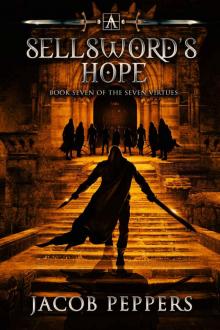 A Sellsword's Hope
A Sellsword's Hope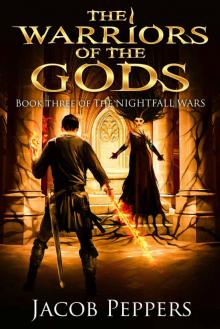 The Warriors of the Gods
The Warriors of the Gods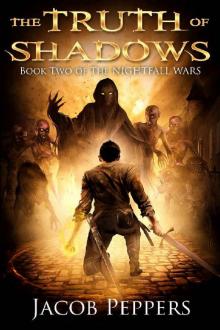 The Truth of Shadows
The Truth of Shadows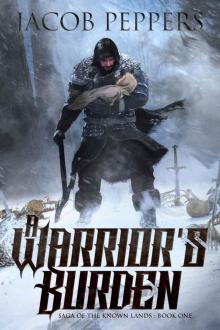 A Warrior's Burden: Book One of Saga of the Known Lands
A Warrior's Burden: Book One of Saga of the Known Lands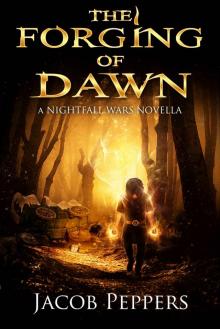 The Forging of Dawn
The Forging of Dawn A Sellsword's Mercy
A Sellsword's Mercy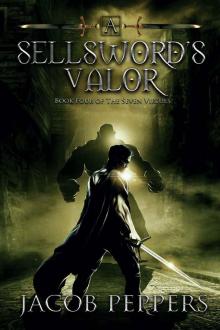 A Sellsword's Valor
A Sellsword's Valor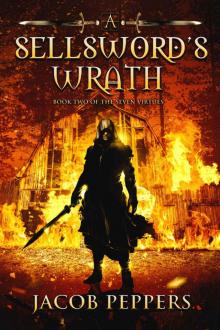 A Sellsword's Wrath
A Sellsword's Wrath A Sellsword's Compassion_Book One of the Seven Virtues
A Sellsword's Compassion_Book One of the Seven Virtues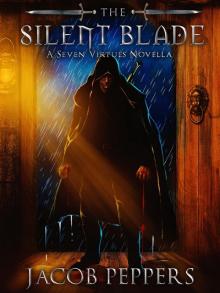 The Silent Blade: A Seven Virtues Novella
The Silent Blade: A Seven Virtues Novella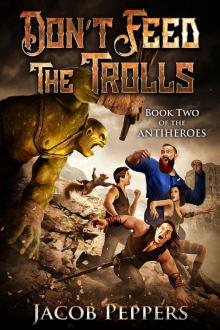 Don't Feed the Trolls
Don't Feed the Trolls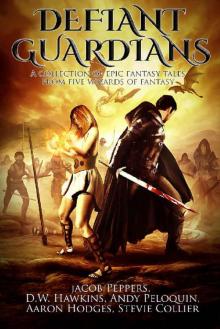 Defiant Guardians Anthology
Defiant Guardians Anthology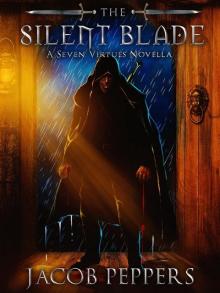 The Silent Blade
The Silent Blade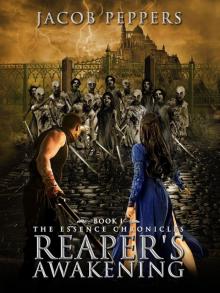 Reaper's Awakening
Reaper's Awakening